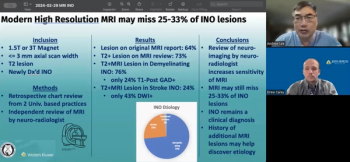
- Ophthalmology Times: November 1, 2020
- Volume 45
- Issue 18
Planning is important — even when “nobody knows nothing”
A word from Chief Medical Editor Peter J. McDonnell, MD.
Once, when I was a young faculty member in Los Angeles, I was invited to my chairman’s office.
“I think it would be good for you to go to business school,” he said, couching it as a way to hone my management, leadership and finance skills for the future.
He said medicine had changed since he was a young faculty member and there was less room for error and more need for planning and being proactive. In retrospect, I think he realized that I knew (or thought I knew) enough to make me dangerous.
Because the motion picture industry is so prominent in Los Angeles, it may not surprise you to learn that my business school professors on occasion used examples from those companies to illustrate certain business principles.
Previously by Dr. McDonnell:
One day, a professor spoke about the problems that resulted when a company that had no experience in entertainment decided to purchase a large successful movie studio.
A group of executives from the acquiring company came to Los Angeles to meet with the people running the studio. The presentation focused on the plans to produce 4 new movies in the coming year.
“We project that one will be a blockbuster, one will make a little money and two will be ‘bombs’” reported the seasoned Tinseltown executives.
After the meetings, the visitors flew thousands of miles home and relayed the information to the big bosses there.
About a week later, the executives in Los Angeles received a phone call. “We have discussed everything you told us and decided that we only want you to produce the blockbuster and the other movie that will make money, but not the two movies that will lose money” was the feedback.
This anecdote generated a lot of laughs because everyone who makes movies knows that predicting in advance which films will be box office successes is pretty much a crapshoot.
One old-time movie mogul is famous for a quote describing the predictive powers of people like him after a multi-decade career: “Nobody knows nothing.”
Related:
This phenomenon is also present in the finance industry, where large companies with many analysts and experts are routinely unable to convert all their research and brain power into investments that outperform amateur investors putting their hard-earned dollars into passive index funds. Time and again, future events and market movements have proven to be unknowable.
Fortunately, medicine is a science and time has proven that ophthalmologists can indeed plan and position our practices for future success. We can fairly accurately project the needs for our services, the number of patients we can see in our clinics and surgeries we can perform in our operating rooms. We can protect our loyal employees who rely on us for their livelihoods and ability to feed their families.
Until now.
Or so it seems some days. Intelligent and hardworking scientists from academic institutions and large well-funded government agencies have developed extremely rigorous models to project what will happen in the next few months as the pandemic enters the wintertime cold-and-flu season.
Recently, I had the opportunity to review a fascinating graph that plotted out the projections of 7 or 8 of these models.
Some of the calculations reveal the prevalence of new infections staying fairly constant while other models predict an onslaught of the disease dramatically worse than what we encountered earlier this year when governors ordered us to shut down clinics and surgery centers for all but the most urgent of problems.
Still other models tell us that the number of cases will decline! One of my colleagues summed things up this way: “Nobody knows what will happen.”
Related:
So what do we ophthalmologists do? Hope for the best but plan for the worst? How do we reassure our loyal hardworking staff that their jobs and paychecks will be there?
Maybe we do live in a time of medicine when “nobody knows nothing.” However, I feel confident that ophthalmologists will rise to the challenge of caring for our patients and our staff during this time when so much is uncertain.
Articles in this issue
about 5 years ago
Investigators study home-based monitoring for exudative AMDabout 5 years ago
Ocular gene therapy offers hope for inherited retinal diseaseabout 5 years ago
Good nutrition optimizes ocular surface in premium cataract patientsabout 5 years ago
Extended depth-of-field IOLs: Clarifying current nomenclatureabout 5 years ago
Investigators show long-term visual declines in DME eyesabout 5 years ago
Developing retinal technologies strengthen visualizationabout 5 years ago
Building a brand is key to developing successful practiceabout 5 years ago
Changing patient conversations around cataract surgeryNewsletter
Don’t miss out—get Ophthalmology Times updates on the latest clinical advancements and expert interviews, straight to your inbox.





























